GALLUP NEWS SERVICE
PRINCETON, NJ -- Americans are more convinced than ever that the Earth is being affected by global warming, but they have still not grown especially concerned about it. Only a third predict global warming will pose a serious threat in their lifetimes.
Public concern about global warming has ebbed and flowed over the past 17 years, and although higher now than when it was last measured in 2004, it is no higher than it has been at several points in the past. Americans are more worried about water pollution, air pollution, and toxic waste than global warming. At the same time, a record number of Americans, 58%, believe climate change as a result of global warming has already begun, and more Americans than ever before also say they understand the issue.
Only 36% of Americans say they worry a great deal about "the greenhouse effect" or global warming. The total percentage worrying a great deal or fair amount is now 62%, up 11 points from the abnormally low reading of 51% recorded in 2004. Today's level is about the average seen across the 10 readings Gallup has taken on this measure since 1989 -- and is nearly identical to the initial reading.
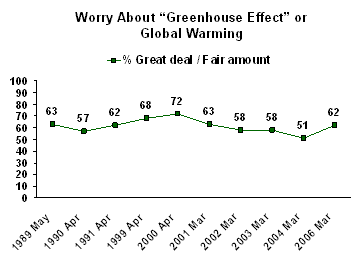
Concern about the related problem of "damage to the Earth's ozone layer" rose eight points since 2004, from 60% to 68%. Again, the current reading is about the norm on this measure asked since 1989, and is similar to the results from 2002 and 2003.
The percentage saying global warming will "pose a serious threat to you or your way of life in your lifetime" is now 35%; 62% think it will not. The current percentage expecting to experience serious problems is similar to the 33% recorded in 2002, but up significantly from 25% in 1997.
Climate Change as a Partisan Issue
The highest levels of concern about global warming since Gallup began tracking this issue in 1989 were recorded toward the end of the Clinton administration, in 1999 and 2000. This could have been related to the international Kyoto Protocol on climate change -- proposed at the United Nations environmental summit in 1997 -- which garnered significant attention over the next several years.
Although Vice President Al Gore signed the protocol in 1998, President Clinton never submitted it to the Senate for ratification because of concerns about the fairness of the U.S. terms relative to those for developing countries, and because of practical problems with obtaining Senate approval.
President George W. Bush took a strong stand against the Kyoto protocol shortly after he took office in 2001, announcing his opposition to it, and his decision not to pursue ratification.
In contrast to the Clinton administration's acknowledgment of global warming as a serious issue, the Bush administration's general skepticism about it seems to have had a direct impact on the degree to which Americans -- and particularly Republicans -- worry about the issue.
Between April 2000 (during Clinton's last year in office) and March 2001 (at the start of Bush's first term), Gallup found no change in the attitudes of Democrats on the issue, but a 14-point drop in concern among Republicans (including independents who lean Republican). Since 1999, Republicans' level of worry about the issue has dipped noticeably, while worry among Democrats has shown less change.
Gallup's March 2004 survey showed unusually low concern about global warming among Democrats as well as Republicans, but concern bounced back this year to 2003 levels or higher among both groups. Still, concern among Republicans has not rebounded to where it was before Bush took office, and there remains a 32 percentage-point difference in concern between Republicans and Democrats, compared with only a 14-point difference in 2000.
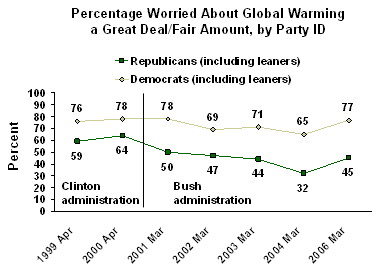
Global Warming Takes Back Seat to Air and Water Pollution
Despite the increased concern about global warming this year, the issue still has a low ranking relative to other environmental problems, many of which also rose as public concerns since 2004. Since Gallup started measuring public concern about global warming in 1989, the issue has always placed near the bottom of a list of 10 environmental issues rated. Water pollution and toxic waste contamination lead the list this year, with more than 50% of Americans highly concerned about these. Air pollution and loss of tropical rain forests also rank higher than global warming. Acid rain ranks lower.
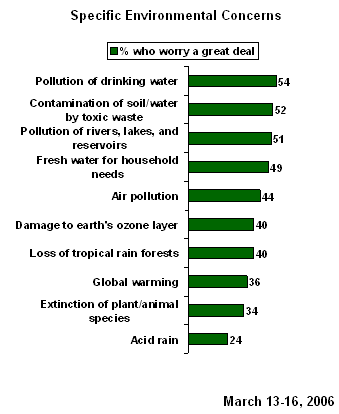
Americans Growing More Familiar With the Issue
Americans profess a bit more knowledge about global warming this year than they have in the past. The percentage of Americans who say they understand global warming now is significantly higher than it was 14 years ago.
About one in five Americans (21%), up from an average of 16% over the previous five years, say they understand the issue very well. A combined 74% say they understand it very well or fairly well. Only 26% say they don't understand it well, the lowest level Gallup has measured.
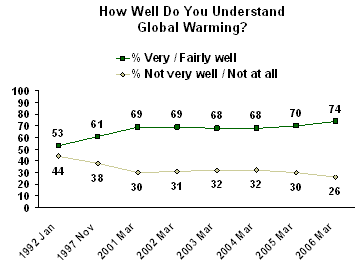
Most Perceive Global Warming as Happening Now
Some scientific research -- including a 2005 report published in the journal Nature -- indicates that global warming is already contributing to lengthier and stronger hurricanes. Only a third (35%) of Americans believe global warming is a major cause of these trends, but another third (33%) think it is a minor cause. Just one-quarter of Americans (26%) say global warming is not related to the increased strength or duration of recent hurricanes.
Consistent with this finding, about 6 in 10 Americans (58%) believe the effects of climatic change have already begun to occur. That is up from 54% in 2005, and is the highest level saying this in trends dating back to 1997. Another 5% believe the effects of global warming will start within a few years and 10% expect these to happen in their lifetimes. Only 15% believe the effects will be postponed to future generations and just 8% are completely skeptical, saying the effects of global warming will never materialize.
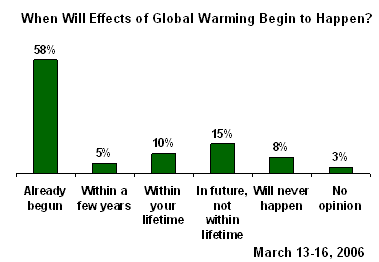
Additionally, more Americans think the seriousness of global warming is underestimated (38%) rather than exaggerated (30%) in news reports on the issue. Another 28% say the media gets it about right. The percentage perceiving that the problem is underestimated in the news is the largest to date, and is substantially higher than the 27% recorded in 1997.
A Man-Made Problem?
Not only do Americans think global warming is real, but most (58%) believe that increases in the Earth's temperature over the last century are due more to the effects of pollution from human activities. Only 36% believe they are the result of natural changes in the environment that are not due to human activities. This is the crux of much scientific and political controversy surrounding global warming, and puts the public firmly on the side of the environmental movement. Attitudes on this have not changed appreciably since the question was first asked in 2001.
Survey Methods
These results are based on telephone interviews with a randomly selected national sample of 1,000 adults, aged 18 and older, conducted March 13-16, 2006. For results based on this sample, one can say with 95% confidence that the maximum error attributable to sampling and other random effects is ±3 percentage points. In addition to sampling error, question wording and practical difficulties in conducting surveys can introduce error or bias into the findings of public opinion polls.
22. I'm going to read you a list of environmental problems. As I read each one, please tell me if you personally worry about this problem a great deal, a fair amount, only a little, or not at all. First, how much do you personally worry about -- [RANDOM ORDER]?
|
2006 Mar 13-16 |
Great deal |
Fair amount |
Only a |
|
% |
% |
% |
|
|
Pollution of drinking water |
54 |
27 |
19 |
|
Contamination of soil and water by toxic waste |
52 |
29 |
19 |
|
Pollution of rivers, lakes, and reservoirs |
51 |
33 |
16 |
|
Maintenance of the nation's supply of fresh water for household needs |
49 |
27 |
23 |
|
Air pollution |
44 |
34 |
22 |
|
Damage to the earth's ozone layer |
40 |
28 |
32 |
|
The loss of tropical rain forests |
40 |
24 |
35 |
|
The "greenhouse effect" or global warming |
36 |
26 |
36 |
|
Extinction of plant and animal species |
34 |
29 |
37 |
|
Acid rain |
24 |
28 |
47 |
C. Damage to the earth's ozone layer
|
|
Great |
Fair |
Only a |
Not |
No |
|
|
|
|
|
|
|
|
2006 Mar 13-16 |
40 |
28 |
19 |
13 |
* |
|
|
|
|
|
|
|
|
2004 Mar 8-11 |
33 |
27 |
26 |
14 |
* |
|
2003 Mar 3-5 |
35 |
31 |
21 |
12 |
1 |
|
2002 Mar 4-7 |
38 |
29 |
21 |
11 |
1 |
|
2001 Mar 5-7 |
47 |
28 |
16 |
8 |
1 |
|
2000 Apr 3-9 |
49 |
29 |
14 |
7 |
1 |
|
1999 Apr 13-14 |
44 |
32 |
15 |
8 |
1 |
|
1991 Apr 11-14 |
49 |
24 |
16 |
8 |
4 |
|
1990 Apr 5-8 |
43 |
28 |
15 |
10 |
4 |
|
1989 May 4-7 |
51 |
26 |
13 |
8 |
2 |
|
* Less than 0.5% |
|||||
E. The "greenhouse effect" or global warming
|
|
Great |
Fair |
Only a |
Not |
No |
|
% |
% |
% |
% |
% |
|
|
2006 Mar 13-16 |
36 |
26 |
21 |
15 |
1 |
|
|
|
|
|
|
|
|
2004 Mar 8-11 |
26 |
25 |
28 |
19 |
2 |
|
2003 Mar 3-5 |
28 |
30 |
23 |
17 |
2 |
|
2002 Mar 4-7 |
29 |
29 |
23 |
17 |
2 |
|
2001 Mar 5-7 |
33 |
30 |
22 |
13 |
2 |
|
2000 Apr 3-9 |
40 |
32 |
15 |
12 |
1 |
|
1999 Apr 13-14 |
34 |
34 |
18 |
12 |
2 |
|
1991 Apr 11-14 |
35 |
27 |
22 |
12 |
5 |
|
1990 Apr 5-8 |
30 |
27 |
20 |
16 |
6 |
|
1989 May 4-7 |
35 |
28 |
18 |
12 |
7 |
28. Next, thinking about the issue of global warming, sometimes called the "greenhouse effect," how well do you feel you understand this issue -- would you say very well, fairly well, not very well, or not at all?
|
|
Very |
Fairly |
Not very |
Not |
No |
|
% |
% |
% |
% |
% |
|
|
2006 Mar 13-16 |
21 |
53 |
20 |
6 |
* |
|
|
|
|
|
|
|
|
2005 Mar 7-10 |
16 |
54 |
24 |
6 |
* |
|
2004 Mar 8-11 |
18 |
50 |
26 |
6 |
* |
|
2003 Mar 3-5 |
15 |
53 |
27 |
5 |
-- |
|
2002 Mar 4-7 |
17 |
52 |
25 |
6 |
* |
|
2001 Mar 5-7 |
15 |
54 |
24 |
6 |
1 |
|
1997 Nov 6-9 |
16 |
45 |
28 |
10 |
1 |
|
1992 Jan |
11 |
42 |
22 |
22 |
3 |
|
* Less than 0.5% |
|||||
29. Which of the following statements reflects your view of when the effects of global warming will begin to happen -- [ROTATED: they have already begun to happen, they will start happening within a few years, they will start happening within your lifetime, they will not happen within your lifetime, but they will affect future generations, (or) they will never happen]?
|
|
Already |
Within |
Within |
Not |
Will |
No |
|
% |
% |
% |
% |
% |
% |
|
|
2006 Mar 13-16 |
58 |
5 |
10 |
15 |
8 |
3 |
|
|
|
|
|
|
|
|
|
2005 Mar 7-10 |
54 |
5 |
10 |
19 |
9 |
3 |
|
2004 Mar 8-11 |
51 |
5 |
12 |
18 |
11 |
3 |
|
2003 Mar 3-5 |
51 |
6 |
12 |
17 |
10 |
4 |
|
2002 Mar 4-7 |
53 |
5 |
13 |
17 |
9 |
3 |
|
2001 Mar 5-7 |
54 |
4 |
13 |
18 |
7 |
4 |
|
1997 Nov 6-9 |
48 |
3 |
14 |
19 |
9 |
7 |
30. Thinking about what is said in the news, in your view is the seriousness of global warming -- [ROTATED: generally exaggerated, generally correct, or is it generally underestimated]?
|
|
Generally |
Generally |
Generally |
No |
|
% |
% |
% |
% |
|
|
2006 Mar 13-16 |
30 |
28 |
38 |
4 |
|
|
|
|
|
|
|
2005 Mar 7-10 |
31 |
29 |
35 |
5 |
|
2004 Mar 8-11 |
38 |
25 |
33 |
4 |
|
2003 Mar 3-5 |
33 |
29 |
33 |
5 |
|
2002 Mar 4-7 |
31 |
32 |
32 |
5 |
|
2001 Mar 5-7 |
30 |
34 |
32 |
4 |
|
1997 Nov 6-9 ^ |
31 |
34 |
27 |
8 |
|
^ Asked of a half sample |
||||
31. Just your impression, which one of the following statements do you think is most accurate -- most scientists believe that global warming is occurring, most scientists believe that global warming is NOT occurring, or most scientists are unsure about whether global warming is occurring or not?
|
|
Is |
Not |
Unsure |
No |
|
% |
% |
% |
% |
|
|
2006 Mar 13-16 |
65 |
3 |
29 |
3 |
|
|
|
|
|
|
|
2001 Mar 5-7 |
61 |
4 |
30 |
5 |
|
1997 Nov 21-23 |
48 |
7 |
39 |
6 |
32. And from what you have heard or read, do you believe increases in the Earth's temperature over the last century are due more to -- [ROTATED: the effects of pollution from human activities (or) natural changes in the environment that are not due to human activities]?
|
|
Human |
Natural |
No |
|
% |
% |
% |
|
|
2006 Mar 13-16 |
58 |
36 |
6 |
|
|
|
|
|
|
2003 Mar 3-5 |
61 |
33 |
6 |
|
2001 Mar 5-7 |
61 |
33 |
6 |
33. Do you think that global warming will pose a serious threat to you or your way of life in your lifetime?
|
|
Yes |
No |
No |
|
% |
% |
% |
|
|
2006 Mar 13-16 |
35 |
62 |
2 |
|
|
|
|
|
|
2002 Mar 4-7 |
33 |
65 |
2 |
|
2001 Mar 5-7 |
31 |
66 |
3 |
|
1997 Nov 6-9 ^ |
25 |
69 |
6 |
|
|
|
|
|
|
^ Asked of a half sample |
|||
34. Thinking about the increase in strength of hurricanes in recent years, do you think global warming has been a major cause, a minor cause, or not a cause of the increase in strength of hurricanes?
|
|
Major cause |
Minor cause |
Not a cause |
No opinion |
|
2006 Mar 13-16 |
35% |
33 |
26 |
6 |
